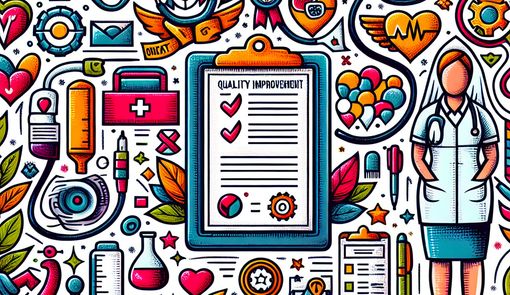Navigating the Path to Becoming a Quality Improvement Nurse

In the landscape of healthcare, the role of a Quality Improvement Nurse stands out as pivotal in shaping the efficacy and safety of patient care. Navigating the path to becoming a Quality Improvement Nurse involves understanding the expectations of the role, acquiring necessary qualifications, and continually evolving within the dynamic environment of healthcare delivery.
Understanding the Role of a Quality Improvement Nurse
A Quality Improvement (QI) Nurse primarily focuses on enhancing the standards of healthcare practices within a facility. They are tasked with analyzing clinical data, identifying areas needing improvement, and implementing change strategies. Their ultimate goal is to ensure compliance with healthcare regulations and to increase overall patient satisfaction and outcomes.
Education and Legal Requirements
The first step on this journey is obtaining the appropriate educational background. Ideally, candidates will have a Bachelor of Science in Nursing (BSN) degree, although some facilities may accept an Associate's Degree in Nursing (ADN). Regardless of degree type, a current Registered Nurse (RN) license is mandatory.
After meeting the foundational requirements, many prospective QI Nurses further their education with a Master's Degree in Nursing or a related field, such as Healthcare Administration or Public Health. Specialty certifications, like the Certified Professional in Healthcare Quality (CPHQ), can offer an edge in the job market and are often sought after by employers.
Gaining Relevant Experience
Hands-on experience is essential. Typically, a QI Nurse will have several years of clinical experience. Expertise in a specific area of nursing can be advantageous, as it provides a deep understanding of particular healthcare procedures and patient care standards.
It is also beneficial to gain experience in leadership roles or participate in committees focused on quality assurance or patient safety within a healthcare setting. These experiences can provide exposure to the methodologies and tools used in quality improvement, such as Six Sigma or Lean Healthcare principles.
Developing Key Skills
Aside from clinical expertise, several skills are vital for success in QI nursing. Strong analytical skills are required to interpret data and identify trends. Communication skills are equally important; QI Nurses must be able to articulate their findings and persuade others to implement changes. Organizational and leadership skills also play a significant role, as the job involves managing multiple projects and leading teams.
Acquiring Certifications and Continuing Education
As healthcare evolves, continuing education becomes critical. QI Nurses must stay updated on the latest quality improvement theories, techniques, and regulations. Pursuing advanced certifications like the CPHQ is recommended. Workshops, webinars, and professional organizations can offer valuable resources and networking opportunities.
The Job Search
When ready to seek a QI Nurse position, one should create a resume highlighting relevant experience and education. Job listings can be found on nursing job boards, hospital career pages, and through professional organizations. Networking with other healthcare professionals can uncover unadvertised positions and provide additional insight into the field.
Climbing the Career Ladder
Once in the role of a QI Nurse, it's important to demonstrate value and seek continued growth. Success might pave the way for roles with greater responsibility, such as Quality Improvement Manager or Director of Nursing.
To summarize, becoming a QI Nurse is a multi-faceted process requiring education, experience, and key competencies. It demands a commitment to lifelong learning and a passion for using evidence-based practices to enhance healthcare outcomes. With dedication and strategic career moves, nurses can make a significant impact on the quality of patient care and thrive in this dynamic and rewarding role.
Frequently Asked Questions
1. What is the role of a Quality Improvement Nurse?
A Quality Improvement Nurse focuses on enhancing healthcare practices within a facility by analyzing data, identifying areas for improvement, and implementing change strategies to ensure compliance with regulations and improve patient outcomes.
2. What educational background is needed to become a Quality Improvement Nurse?
Candidates typically need a Bachelor of Science in Nursing (BSN) degree and a Registered Nurse (RN) license. Some facilities may accept an Associate's Degree in Nursing (ADN). Further education with a Master's Degree in Nursing or related field is beneficial, along with specialty certifications like the CPHQ.
3. How important is hands-on experience for a Quality Improvement Nurse?
Hands-on clinical experience is essential for a QI Nurse, typically including several years of experience in a clinical setting. Specialization in a particular area of nursing can be advantageous, as well as experience in leadership roles or quality assurance committees.
4. What key skills are needed for success as a Quality Improvement Nurse?
Strong analytical skills, effective communication, organizational abilities, and leadership qualities are crucial for QI Nurses. They need to interpret data, communicate findings, manage projects, and lead teams effectively.
5. How can QI Nurses stay updated on industry trends and advancements?
Continuing education is vital for QI Nurses to remain current on quality improvement theories, techniques, and regulations. Pursuing advanced certifications, attending workshops, webinars, and joining professional organizations can provide valuable resources and networking opportunities.
6. Where can one find job opportunities as a Quality Improvement Nurse?
Job listings for QI Nurses can be found on nursing job boards, hospital career pages, and through professional organizations. Networking with other healthcare professionals is also recommended to uncover hidden job opportunities and gain insights into the field.
7. What are the potential career advancements for a Quality Improvement Nurse?
Successful QI Nurses may progress to roles with greater responsibilities, such as Quality Improvement Manager or Director of Nursing, by demonstrating value, seeking growth opportunities, and making strategic career moves.
Further Resources
For those interested in pursuing a career as a Quality Improvement Nurse, the following resources can provide valuable information and support:
- American Nurses Association (ANA)
- Website: ANA Quality Improvement Resources
- The ANA offers a wealth of resources on quality improvement practices, certification information, and networking opportunities.
- Healthcare Quality Certification Board (HQCB)
- Website: HQCB Certification Programs
- The HQCB administers the Certified Professional in Healthcare Quality (CPHQ) certification, a valuable credential for QI Nurses.
- Institute for Healthcare Improvement (IHI)
- Website: IHI Quality Improvement Resources
- IHI provides education, tools, and resources to support healthcare professionals in improving patient care.
- National Association for Healthcare Quality (NAHQ)
- Website: NAHQ Professional Development
- NAHQ offers professional development opportunities, webinars, and conferences focused on healthcare quality and patient safety.
- Agency for Healthcare Research and Quality (AHRQ)
- Website: AHRQ Quality Improvement Tools
- AHRQ provides evidence-based tools and resources to enhance healthcare quality and patient outcomes.
- LinkedIn Groups
- Joining LinkedIn groups like 'Quality Improvement in Healthcare' or 'Nurse Leaders Network' can facilitate networking and knowledge sharing among QI professionals.
- Books
- Quality and Performance Improvement in Healthcare: Theory, Practice, and Management by Patricia Shaw and Ronald Valenti
- Lean Hospitals: Improving Quality, Patient Safety, and Employee Engagement by Mark Graban
These resources offer a comprehensive foundation for aspiring Quality Improvement Nurses to deepen their knowledge, acquire certifications, and stay updated on industry trends and best practices. Continuous learning and engagement with professional communities can enhance career development and ultimately contribute to improved healthcare outcomes.






